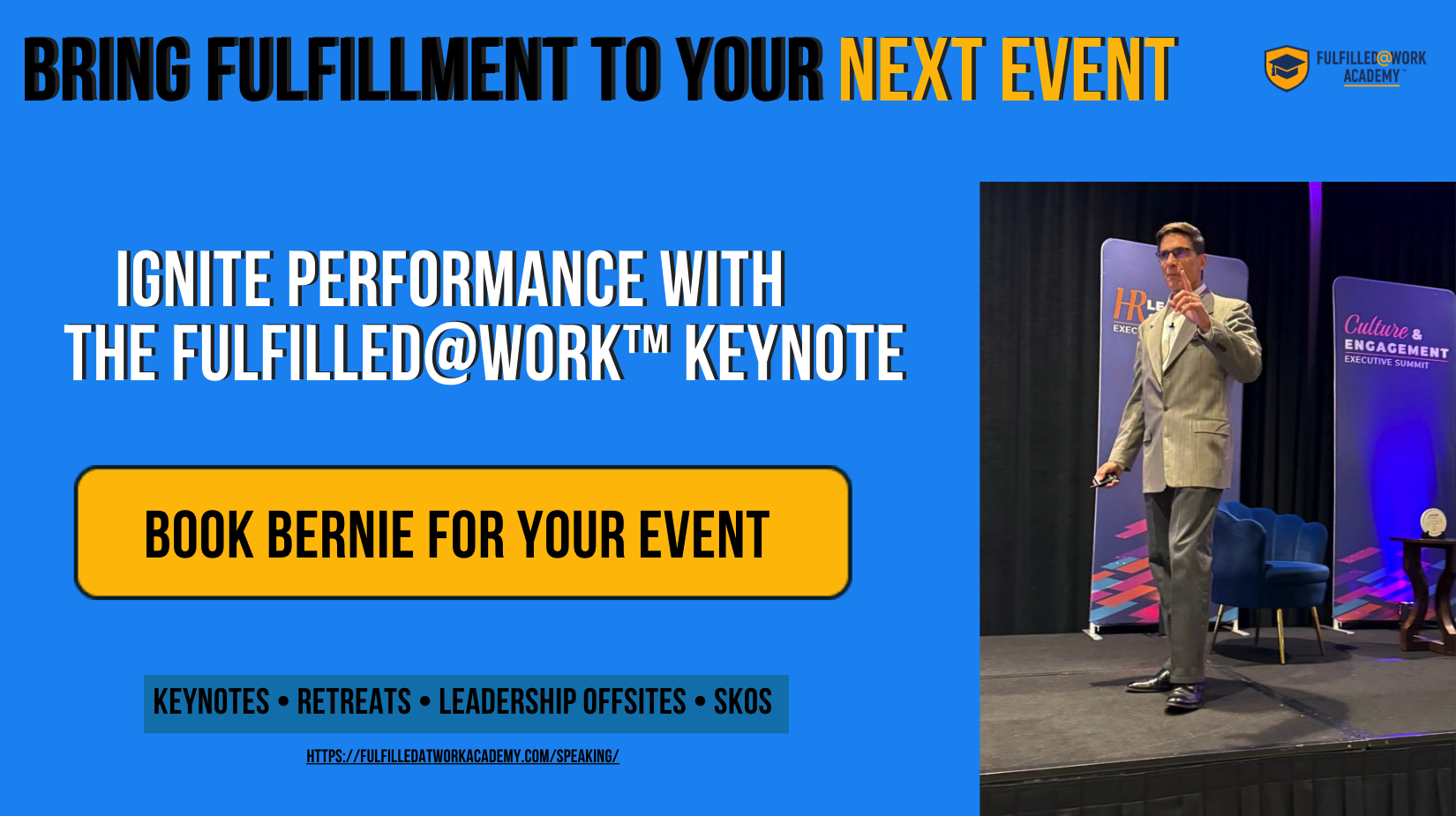Bernie Borges [00:00:00]:
This is Bernie Borges, host of the Life Fulfilled podcast. And this is part three of three in our series on quiet quitting. If you’ve been with me for parts one and two, you’ve heard me define quiet quitting, connect it to fulfillment, and share perspectives from both the employees and leaders. You’ve also heard me offer some practical action steps that you can take to address quitting quiet quitting as the individual level and at the leader level. Now, if this is your first episode in this series, welcome. I encourage you to go back though, and catch the first two episodes. But for now, stay with me because we’re going to connect some very important dots in this episode. I want to zoom out.
Bernie Borges [00:00:47]:
Let’s look at quiet quitting through the lens of culture. And no, I don’t mean mission statements on a wall. I mean the lived experience of work, the way people feel, behave and perform every day. That’s the real culture of an organization. And when that culture is broken, quiet quitting becomes the norm instead of the exception. Now, let me give you some numbers that should matter to every business leader. According to Gallup, and again, they’re the largest source for these types of statistics. Global employee engagement dropped from 23% to 21% in 2024.
Bernie Borges [00:01:32]:
That means 79% of the workers around the world are not engaged. That’s appalling. And in the US Specifically, half half of the workforce is considered not engaged, which Gallup equates to quiet quitting. These are people who are physically on the job, but mentally and or emotionally, they’ve checked out. Just think about what that means for your team, your department, your company. This is also appalling. Gallup also found that this disengagement cost the global economy $8.8 trillion annually. That’s trillion with a t.
Bernie Borges [00:02:20]:
And it represents about 9% of the global GDP. Think about that for a second. Disengagement is literally draining nearly 10% of global economic output. And yet some leaders still treat fulfillment as a perk or a nice to have. Well, considering these sobering statistics, I’d argue that fulfilled employees, which translates to engaged employees, are as essential as payroll and cash flow, maybe even more so. What do you do about it? Well, let’s talk about the opportunity that we have in front of us. Behind every disengaged employee is a human being who wants to care again, but they need a reason to. I believe quiet quitting can be reversed.
Bernie Borges [00:03:11]:
Maybe not to zero, but substantially. However, it doesn’t start with policies or perks. It starts with leaders. It Starts with culture. And it starts with some brutally honest questions. If you’re a leader, ask yourself, when was the last time I had a real human conversation with each person on my team, even if it wasn’t work related? Do people feel safe bringing me feedback or concerns? Have I created an environment where people understand how their work connects to a bigger purpose? If you answered these questions honestly and the answers are fuzzy, or even worse, the answer is I don’t know, that’s your cue. You can’t fix what you’re not willing to face. And the truth is, most employees don’t leave companies.
Bernie Borges [00:04:09]:
They leave managers. I’m sure I’m not the first to tell you this. You’ve heard this before. Actually, let me put it to you another way. They leave managers who aren’t invested in their growth or fulfillment. Now, I’m not trying to beat up on leaders. I’ve been in leadership roles both in corporate and in my own company with employees. And I know how hard it is and I’ve had my struggles and share of mistakes.
Bernie Borges [00:04:37]:
But if you’re going to lead people, you need to make fulfillment a top priority to reach engagement levels that are healthy for the employee and for the business. Otherwise, you’re just managing a slow bleed. I’ve seen teams where the leader was checked out and then the top talent quietly slipped away one by one. Not out of protest, just from a lack of connection. So I want to offer you some solutions. Whether you work with me or not, you can use what I’m about to share. Here are five simple things that any leader can start doing immediately to create a culture of fulfillment and rebuild engagement. Number one, have one real check in conversation and every week with each team member.
Bernie Borges [00:05:27]:
This is not a performance review, it’s a check in. Ask questions like how’s it going? What’s giving you energy lately? What’s draining you? Where would you like to grow this quarter? Where do you want to be in three years, five years? These questions start conversations that build trust. And trust is the foundation of engagement. Number two, Recognize people more than you think you need to. This is huge. People aren’t just motivated by a paycheck. They’re motivated by feeling valued. Don’t wait for annual reviews or big wins.
Bernie Borges [00:06:08]:
Recognize small wins. Recognize effort, even when it involves failure. Thank people publicly and privately. Acknowledge the things that most people overlook. Let your people feel that you see them and appreciate them. Number three, create clarity. Employees want to know what success looks like and why it matters. If your team doesn’t have clarity about the mission, the goals and how their work contributes, they’ll stop caring.
Bernie Borges [00:06:42]:
Clarity isn’t just good for performance, it’s good for fulfillment too. Number four, Model what you want to see in your people. If you want your team to be honest, be honest first. If you want them to take initiative, show them what that looks like. Culture is lived, not taught. Your behavior sets the tone. Number five, and probably the most important one, be humble. Everything in steps one through four requires humility.
Bernie Borges [00:07:18]:
Don’t approach any of those steps thinking that you have all the answers. Gain clarity on your own ability to connect authentically with your people. Recognize where you can improve and commit to improving. Now, these five actions are simple, but they’re not always easy. You’re already very busy, but remember the difference between working in the business and on the business. If you’re spending all your time working in the business, then to be candid, you don’t deserve to be a leader. You should be an individual contributor. Now, if you own the business and you’re very hands on working in the business, you need to be a magician.
Bernie Borges [00:08:04]:
What I mean is that if you have to be working in the business all the time, you have to figure out a way to also lead your people through this lens of fulfillment. That’s what I mean by you need to be a magician. As the business owner, you’re well served if you have other executives on your team with whom you can divide the labor, the work of working in the business so that you can devote enough time and enough energy to showing your people that you want to have these conversations, that you really care about them. Do whatever it takes to make this happen, no matter how time constrained you are. Now, if you don’t really care about your people, that’s a different challenge and that’s outside the scope of this podcast. Leading your teams with authentic conversation requires intentionality, consistency and humility. But it will absolutely move the needle. Now, if you’re not a leader, you’re an employee, or you’re self employed and you’re listening to this thinking, I don’t have control over the culture, let me say this, you have more influence than you think.
Bernie Borges [00:09:22]:
Start with your immediate circle of control. Talk to your peers. Share this episode with your manager. Ask better questions in meetings. Offer ideas even if they’re small. Quiet quitting spreads silently, but so does energy. Be the person who brings the light into the room. If you’ve made it this far in this three part series on quiet quitting, thank you.
Bernie Borges [00:09:52]:
It means you care. And if you care, that says something important about you. You want to make work more fulfilling, whether that’s for yourself, your team, or your organization. And I want to help you do that. So here’s what you can do next. If you haven’t already taken the Fulfill that Work scorecard, go do that now. It’s totally free. It only takes two minutes, and it’s going to help you see where your fulfillment at work is strong and where it’s slipping.
Bernie Borges [00:10:21]:
And I also offer you the optional bonus of content to help you on that journey. You’ll find the link in the show notes for this episode. It’s also on my website at fulfilled@workacademy.com if you’re a leader and you want to talk about how to bring this work into your team or your business, schedule a complimentary strategy call with me. I’ll ask you a few simple questions about your current team dynamics and and offer actionable insights right on the call. No pressure, just value. If you have found this three episode series on Quiet Quitting helpful in any way, please tell me. My email address is in the show notes for this episode and for each episode for that matter. And I’d love to hear from you.
Bernie Borges [00:11:07]:
Don’t settle for a culture of survival. Build a culture where people thrive. Whether you’re one person or leading hundreds, you have more influence than you think. I’m Bernie Borges, founder of the Fulfill at Work Academy and host of the Life Fulfilled podcast. This wraps up my three part series on Quiet Quitting, but the conversation doesn’t end here. Let’s keep it going in your team, in your culture, and in your leadership. Subscribe to the podcast, leave a review and share this series with someone who needs to hear it. Until next time, Remember, fulfillment at work isn’t a luxury.
Bernie Borges [00:11:52]:
Fulfillment is the fuel for your best work and your best life.





